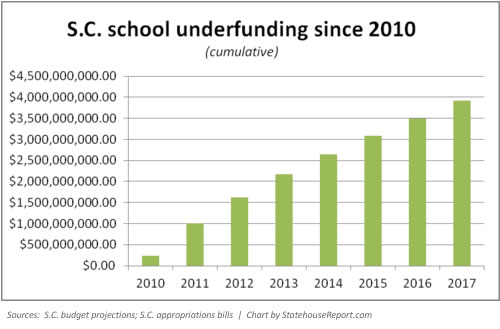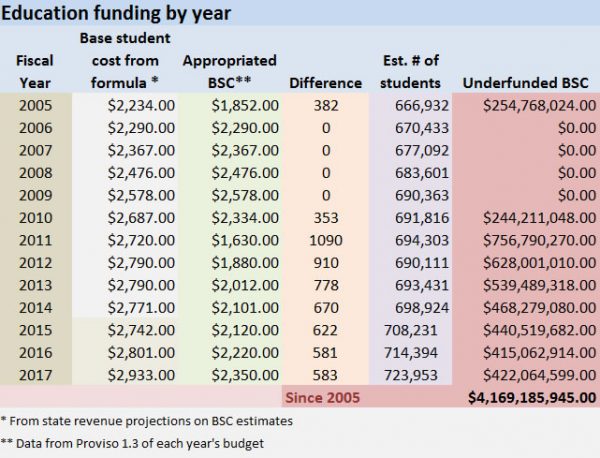
By Andy Brack, editor and publisher | Boy, the S.C. legislature’s lawyers have some gall.
In a state where public education has been underfunded by about $4 billion since 2010, lawyers for the General Assembly and Gov. Nikki Haley essentially say they’ve done enough to comply with a state Supreme Court order to do more for poor school districts.
 Yeah, right.
Yeah, right.
More than two decades ago, a handful of poor school districts brought suit against the state seeking more equitable education funding. Referred to as the Abbeville case, the lawsuit wound its way through a too-slow judicial process until late 2015 when the state Supreme Court finally ordered the General Assembly and school districts come up with a way to pay for the state’s failure to provide adequate public education opportunities, especially in poor, rural districts. The court said it would provide oversight on the case until the state got its act together.
Earlier this year, House lawmakers introduced a package of bills to move things along. By the end of the session, four bills passed, but two of them called for studies. Bottom line: the General Assembly nibbled around the edges, desperately trying to avoid what it really needs to do — pump millions of dollars into public education to create better school buildings, bolster teachers, offer expanded classes and more. In other words, they need to dramatically and comprehensively reform public education and its funding– not just in poor areas, but everywhere — so our students will be ready for the rapidly-changing workplace of the 21st century.
 If you think state lawmakers truly value public education, look at their record on funding. Since 2010, the state legislature has shortchanged public education by an estimated $3,914,417,921.00. Here’s how: Every year, lawmakers get a figure of what the “base student cost” should be based on a formula that is law. But when it comes to budget time, lawmakers creatively “determine” what the formula should be, which allows them to lower the base student cost and steer mandated education dollars to politically-expedient priorities.
If you think state lawmakers truly value public education, look at their record on funding. Since 2010, the state legislature has shortchanged public education by an estimated $3,914,417,921.00. Here’s how: Every year, lawmakers get a figure of what the “base student cost” should be based on a formula that is law. But when it comes to budget time, lawmakers creatively “determine” what the formula should be, which allows them to lower the base student cost and steer mandated education dollars to politically-expedient priorities.
In 2010 as the state’s finances swayed in the Great Recession, lawmakers cut the base student cost from the formula of $2,687 per student to $2,334, which resulted in $244 million in underfunding based on the law. The next year, things were tighter as the formula ($2,720) was cut to $1,630, which led to a $757 million shortfall. Only in the current 2017 budget has the base student cost returned to the level that was appropriated in 2010. This year, schools are still left with an underfunded gap of $422 million.
On Aug. 25, the state’s lawyers filed a motion seeking to get the Supreme Court off the legislature’s back on school funding. They admitted more work needed to be done, but added that the state has been “acting in good faith to implement a remedy for the Court’s concerns and that the rationale for the reservation of continuing jurisdiction is no longer applicable.”
Hogwash. If anything, the high court’s jurisdiction is needed more — to hold the General Assembly’s feet to the fire to actually do something, not keep saying “trust us” or “we’re getting to it.”
 Lawyers for the poor districts agreed, noting in a Sept. 6 response: “The record of this litigation has established that, without judicial oversight, the General Assembly will not attack the systemic education problems plaguing the plaintiff districts and address the educational crisis facing their children. History has shown that without court intervention, these children will have no relief, and the constitutional violations identified in Abbeville II will continue unabated.”
Lawyers for the poor districts agreed, noting in a Sept. 6 response: “The record of this litigation has established that, without judicial oversight, the General Assembly will not attack the systemic education problems plaguing the plaintiff districts and address the educational crisis facing their children. History has shown that without court intervention, these children will have no relief, and the constitutional violations identified in Abbeville II will continue unabated.”
Bernadette R. Hampton, president of the S.C. Education Association, added this week: “Our children cannot wait any longer for the inadequacies in the state’s public school system to be addressed. It is essential that our children’s future be given its rightful priority.”
Legislatures across the nation are being put on the hot seat over equitable school funding. Just witness how a Connecticut judge this month excoriated its legislature for not funding poorer inner-city schools adequately.
The writing has been on the wall for South Carolina leaders for years that the day was coming to fund schools appropriately. It’s time to stop playing legal games and do the work.
Have a comment? Send to: editor@charlestoncurrents.com



 We Can Do Better, South Carolina!
We Can Do Better, South Carolina!
























